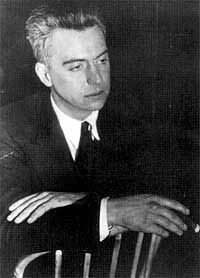Nancy Hanks, the chair of the Queens County Independence Party and author of the popular blog THE HANKSTER has submitted a poem for us by Hart Crane.

By Hart Crane
We make our meek adjustments,
Contented with such random consolations
As the wind deposits
In slithered and too ample pockets.
For we can still love the world, who find
A famished kitten on the step, and know
Recesses for it from the fury of the street,
Or warm torn elbow coverts.
We will sidestep, and to the final smirk
Dally the doom of that inevitable thumb
That slowly chafes its puckered index toward us,
Facing the dull squint with what innocence
And what surprise!
And yet these fine collapses are not lies
More than the pirouettes of any pliant cane;
Our obsequies are, in a way, no enterprise.
We can evade you, and all else but the heart:
What blame to us if the heart live on.
The game enforces smirks; but we have seen
The moon in lonely alleys make
A grail of laughter of an empty ash can,
And through all sound of gaiety and quest
Have heard a kitten in the wilderness.
***
Hart Crane is a significant, some say pivotal, American poet. He was born in 1899 in Garrettsville, Ohio (the same year that Charlie Chaplin was born, in London) to middle class parents who, incidentally, were Christian Scientists. Crane moved to New York City in 1916 and spent some time in Paris. He lived a gay life from the time he was a teenager. (Also see Hart Crane and the Homosexual Text (1992) by Thomas Yingling. “Chaplinesque” was written in 1922 as a response to Charlie Chaplin’s The Kid, released in 1921. (Charlie Chaplin was an internationally recognized filmmaker by 1921.) Hart Crane is probably best known for his epic “The Bridge”, an ambitious ode to his Romantic inheritance from Walt Whitman (b. 1819, Brooklyn NY) and Ralph Waldo Emerson (b. 1803 in Boston – during Thomas Jefferson’s presidency), as well as a more “optimistic” view as a response to T.S. Eliot’s (b. 1888, St. Louis) “The Waste Land” (1922). Crane was not considered to be particularly successful during his life — “an imprecise and confused artist” as one critic put it; his major work “The Bridge” fell short of its task of exploring and giving poetic expression to the “whole American experience.” Crane was “schizophrenic” in a sense, constantly working to be optimistic in his poetry, but giving in to depression in his personal life. He committed suicide at age 32.From The Poetry Foundation: “Allen Tate, writing in his Essays of Four Decades, assessed Crane’s artistic achievement as an admirable, but unavoidable, failure. Tate noted that Crane, like the earlier Romantics, attempted the overwhelming imposition of his own will in his poetry, and in so doing reached the point at which his will, and thus his art, became self-reflexive, and thus self-destructive. “By attempting an extreme solution to the romantic problem,” Tate contended, “Crane proved that it cannot be solved.”
In that spirit, Hart Crane, for me, is the Kurt Gödel of (American) poetry. A game-changer, a fellow traveler of mine.
In his essay “General Aims and Theories” (which I cannot find online, but which is published in The Complete Poems and Selected Letters and Prose of Hart Crane, Doubleday Anchor Books, 1966), Crane writes:
“I am concerned with the future of America, but not because I think that America has any so-called par value as a state or as a group of people… It is only because I feel persuaded that here are destined to be discovered certain as yet undefined spiritual quantities, perhaps a new hierarchy of faith not to be developed so completely elsewhere. And in this process I like to feel myself as a potential factor; certainly I must speak in its terms and what discoveries I may make are situated in its experience.”
I have always been touched by this passage. In the same essay, writing about “technical considerations” of his poetry, he talks about the “organic principle of a ‘logic of metaphor,’ and says, as a post-impressionist modernist:
“It is my hope to go through the combined materials of the poem, using our “real” world somewhat as a spring-board, and to give the poem as a whole an orbit or predetermined direction of its own… It is as though a poem gave the reader as he left it a single, new word, never before spoken and impossible to actually enunciate, but self-evident as an active principle in the reader’s consciousness henceforward.”
I like this poem because of its humanity.
